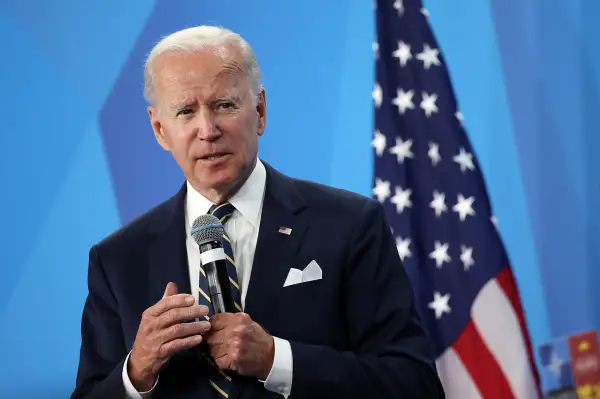Will Biden Push Back Student Loan Payments Again?

Student loan borrowers are likely feeling a sense of déjà vu.
The pandemic-era pause on federal loan payments — which has been extended six times — is nearing its Aug. 31 expiration date. With just over a month to go, many borrowers are wondering whether the forbearance period will be extended once again, and though there hasn’t been any official announcement, signs point to “maybe.”
President Joe Biden told reporters last week that he planned to make a decision on student loans by the end of August. The Education Department, meanwhile, recently told loan servicers not to reach out to borrowers regarding their payments resuming, according to an official with the Student Loan Servicing Alliance.
“The lack of borrower communication to date makes the payment pause extension highly likely,” says Robert Farrington, founder and CEO of The College Investor, a website that focuses on finances for student loan borrowers. He noted that loan servicers are supposed to give borrowers a minimum of six notices prior to payments restarting — a process that hasn’t started happening.
When will student loan payments actually resume?
The moratorium on federal student loan payments was originally signed into law in March 2020 by then-president Donald Trump. The pandemic relief package, which applied to borrowers with federally held loans, also stopped interest from accruing and stopped collections from borrowers who defaulted on their loans.
The forbearance period was set to last through September 2020. However, it was extended twice during the Trump administration. When Biden took office, he signed an executive order to continue the payment pause through September 2021. Then he approved another extension through January 2022, which Biden said would be the last. But by December, the omicron variant was rampant in the U.S., and Biden granted yet another extension through May 1. In April, the pause was extended through Aug. 31.
Now that we're weeks out from the latest deadline, tens of millions of borrowers are waiting for word about whether they will have to begin repaying their student loans after a nearly two-and-a-half year break. (The moratorium doesn't apply to private student loans or some older federal loans.)
During the break, less than one in five borrowers who were eligible for the forbearance actually made a payment on their student loans, according to researchers with the New York Fed. Other surveys have suggested some borrowers may struggle to resume making payments after such a long pause.
Biden officials haven't shared their thoughts on the need for a seventh extension. But a group of Democrats and some consumer advocates have been pressuring Biden to issue another extension, especially as excessive inflation has pushed prices on everything from gas to food to record levels.
Some Democrats also worry that allowing the extension to end before the midterm elections could hurt the party's chances of winning state and local races.
With that in mind, the question is not if — but how long — the moratorium will be extended, according to Farrington. A new deadline prior to the midterms “seems politically too short,” he says. “Alternatively, putting the extension deadline at the end of the year could be possible, but it also seems less likely of an outcome given it will be the holiday season.”
Farrington believes the payment pause will likely be extended until Jan. 31, 2023.
“As to whether this will be the last one, it’s uncertain,” he adds. “I think the administration is trying to extend the pause as long as possible so they can sort out any potential forgiveness plans or other student loan reforms.”
What's the latest news on student loan forgiveness?
Biden administration officials indicated back in April that they hoped to make a decision regarding widespread student loan forgiveness before loan payments resume. Several recent news reports, all quoting anonymous officials, also have suggested that Biden is close to making a decision on whether he will use executive authority to cancel loans.
The president campaigned on large-scale loan forgiveness, and while in office, he has reiterated that he’s open to forgiving up to $10,000 in federal debt per borrower. But he always was hesitant to use executive action to do so, and it’s likely that any widespread forgiveness program will cap eligibility based on income. (Reports have suggested the cutoff would be $125,000 or $150,000.)
Some say that wouldn't go far enough to truly help borrowers. Progressive Democrats such as Sen. Elizabeth Warren, Senate Majority Leader Chuck Schumer and Rep. Alexandria Ocasio-Cortez continue to push for broader forgiveness, such as canceling $50,000 in student debt per borrower. The NAACP also advocates for eliminating $50,000 per person — particularly Black borrowers, who hold higher student loan balances — without income caps or other means testing.
For now, nothing is set in stone. Borrowers should prepare to resume their payments in September unless they hear otherwise. And until there’s a more concrete plan to forgive student loans, borrowers shouldn’t bank on that possibility as a get out of jail free card. For those who are struggling financially, looking into income-based repayment programs and other existing student loan forgiveness programs could help.
More from Money:
Colleges Are Hiking Tuition This Fall Amid Sky-High Inflation
40% of Americans Believe Biden Will Cancel Some Student Loan Debt Before the Midterms
Student Loan Forgiveness: New Research Shows Who Would Get the Largest Benefits
